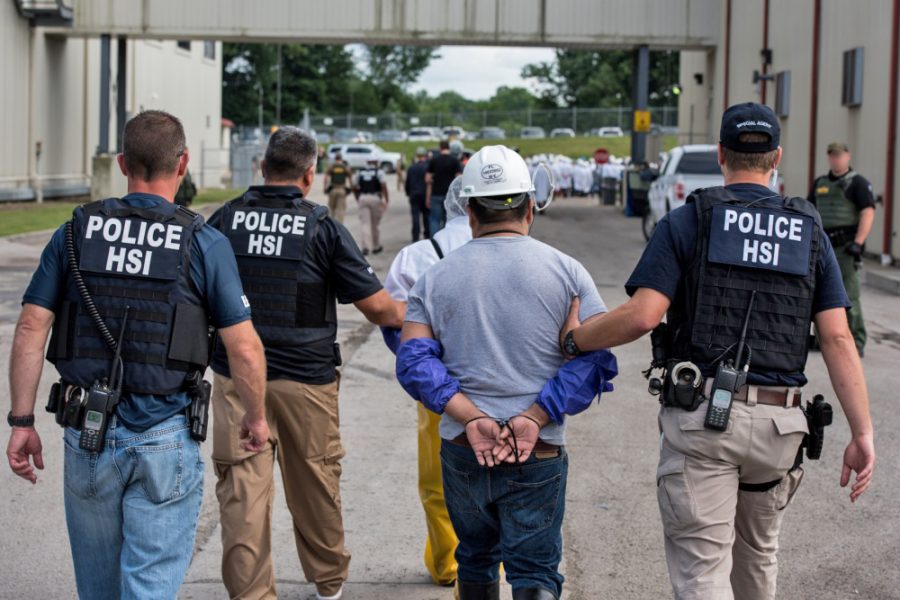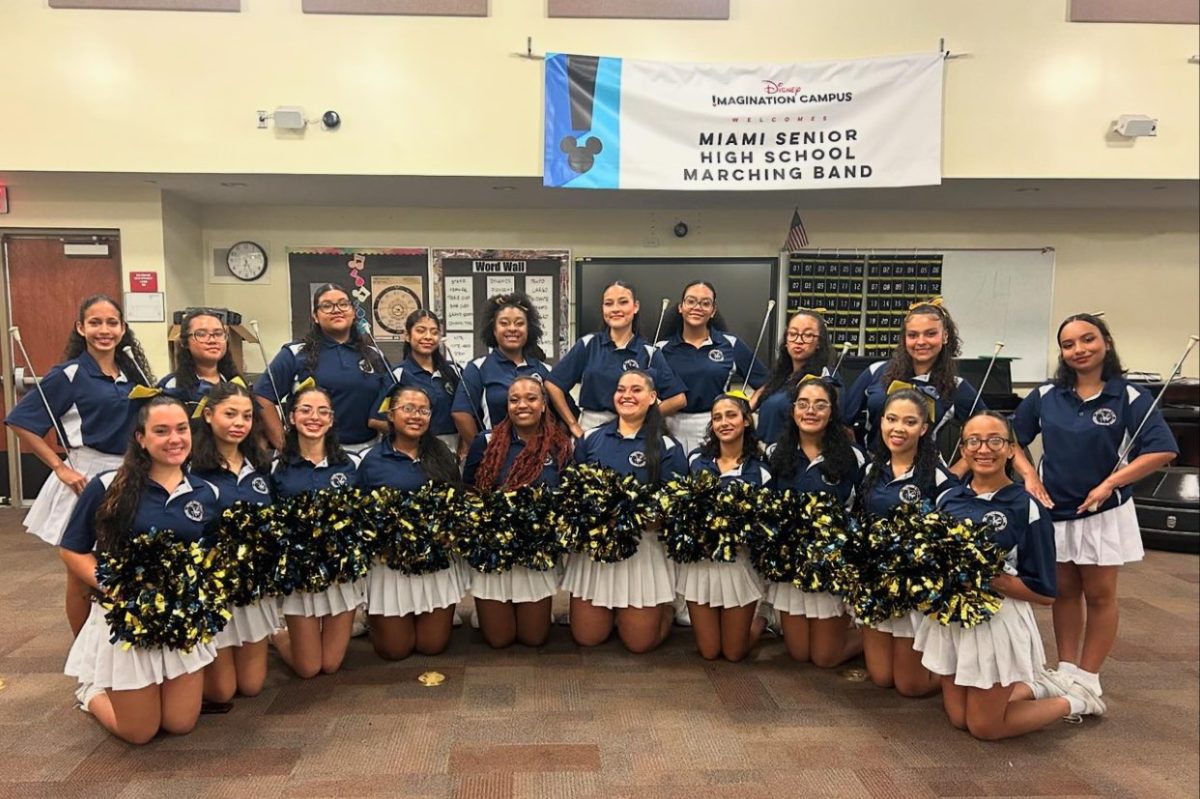ICE: An Immigrant’s Struggles, Not a Myth But a Reality
December 13, 2019
The whole American continent was first discovered around the 1490’s and was colonized first by the same Spanish speaking immigrants that found it. Since then, the United States has been composed of immigrants from all over the world; that’s why it is such a diverse country, with history and culture from everywhere.
However, over the years, the country seems to have forgotten its roots to the point where the government has even created organizations to make sure those immigrants who do not possess legal documents and status, are “sent back to where they belong”. The name of this organization is Immigration and Customs Enforcement (ICE), and many students here at Miami High have faced them or know someone who has.
When I first interviewed students and asked them if they had any experience with officers of ICE, most of them said that they didn’t, but that they knew someone who did; however, Jose Valledares, a junior here at Miami High, did have a story to share.
“Get away from them. If they come knocking on your door, turn off the lights; turn off everything. Try to make sure that they think you’re not there. If they know that you’re there, just ask them for a warrant signed by a judge. Make sure you record it and get the word out. Hide if you can, but don’t try to fight back, because you will get hurt, and they are strong.”
-Jose Valladares
Taking over the streets
Jose was born in Florida. Son of a Hispanic couple (Cuban dad and Venezuelan mom), he grew up in the United States with its customs, culture, and history. Yet, one day in November, while walking home, he was bombarded by two armed officers with questions about his legal status and documents that allowed him to live here. At the moment of the interrogation, he was asked to show his documentation.
Jose told the officers that he was born in the USA, and to prove it he showed them his ID. They asked to search his house to prove that he belonged in the country, but Jose did not let them invade his privacy and his home by demanding that they show him a warrant from a judge, (which is the only way they are allowed to enter a house as officers). He also didn’t want them to bother his dad, whom he was very worried about since he was at house where Jose was heading to.
Jose had to show the officers his birth certificate so they would leave. After doing so and shutting the door, they kept knocking until they gave up and left. Although Jose was very brave to stand up and not allow the officers to search his house, it was nowhere near a nice experience to either him or his dad to go through.
He said he was judged by the officers because of his appearance, which Jose considered to be annoying and rude. When asked what his advice would be for people who encounter ICE officers, he said: “Get away from them. If they come knocking on your door, turn off the lights; turn off everything. Try to make sure that they think you’re not there. If they know that you’re there, just ask them for a warrant signed by a judge. Make sure you record it and get the word out. Hide if you can, but don’t try to fight back, because you will get hurt, and they are strong.” This has been his only encounter with ICE so far, but he does not wish to live through this experience or come across any other similar one ever again.
Weakened by the distance
Jose is not the only student at Miami High that has had direct or indirect experiences with ICE officers. Student Maria Suazo’s friend’s dad was taken away to an ICE facility when the dad’s car’s papers were checked due to lack of insurance, which was what led the ICE officers to find out he was undocumented, leaving his family, including his pregnant unemployed wife and three other children who were also undocumented, in a shaky financial condition.
After he had resided in the USA for four years, he was imprisoned for several years and then deported back to his native country. Maria said that her friend’s dad contacted a lawyer, who didn’t stay on the case for too long since the family couldn’t afford it. Nevertheless, he did apply for a public lawyer who unfortunately didn’t stay for long either because the case had “no resolution”, explains Maria, since the dad already had a deportation order and there wasn’t sufficient evidence to back up and construct a case that would defend him and get him back to his family and normal life.
Maria talks about how the imprisoned dad was also weakened by the fact that he could barely talk to anyone else, especially his own family, whom he could only contact through a phone call that had to be paid. The family didn’t visit much either, because as revealed earlier, they were undocumented too. They were afraid that they could get into the same situation as him; thus, it was better to keep a distance.
Maria believes there was a violation of human rights in this case, because the accused man didn’t have the emotional support of his family, or any support at all, not to point out that since he could barely communicate with his family, they weren’t able to know what was happening and therefore were unable to help more with the case in terms of seeking for legal aid and advice.
“Terrible things are happening outside… poor helpless people are being dragged out of their homes. Families are torn apart; men, women and children are separated. Children come home from school to find that their parents have disappeared.”
-Anne Frank
Chained to the core
Miami High sophomore Daniela Arredondo’s aunt was also indirectly involved in a different case with ICE. Daniela narrated how her aunt in Mississippi took care of the children of immigrant parents who were taken by ICE officers because they were undocumented and were using false identities to be able to work in a factory.
Daniela adds the detail that for undocumented mothers to be freed or sent back to work or their houses, they had to have the excuse that they were the only adults who could take care of their children. Daniela talks about two specific mothers who were from Guatemala and used the same phone to call the fathers of their respective kids. Although they talked in a Guatemalan dialect, ICE officers had translators who were able to decipher the language and caught the two mothers. They were both given ankle monitors and sent to New Orleans to be then deported, along with the others who didn’t have another person to take care of their kids.
Many of the women who were taken and then liberated lost their jobs because of what had happened (their new police records). Although a couple were set free, they still had ankle monitors on them, which didn’t reflect the exact image you want your children to see you in. Others were lucky enough to have the night shift, and had been warned about what had taken place in the day shift, so they were purposefully absent for a couple of days until the ICE waters were calmed.
Daniela states how many of the women have already been deported and others are waiting for their case to be taken to court. Those who have been already sent back to their native countries didn’t have many visitors, if any, during the time they were imprisoned. Those who are still in the facilities continue to wait for their fair trial, without their freedom and their families.
Undocumented and unafraid
There are many more cases out there waiting to be written and shared with the rest of the world. As for the Miami High community, composed of a high percentage of immigrant and undocumented students, you’re not alone. You’re heard, seen and supported. There are far more difficult cases that have been published by the media or kept hidden from the public, where many disappear or are never heard of again, and no one gives an explanation for it.
Something that was not answered nor questioned in the first place was: how does this reflect on and affect the children of tomorrow, the next generation, the future? Studying cases like the ones presented and many others, reveals patterns that were present during the Holocaust many years ago, making it seem like we haven’t learned from history and our mistakes, for history is repeating itself once again.
As she wrote in her diary, Anne Frank looked around and said, “Terrible things are happening outside… poor helpless people are being dragged out of their homes. Families are torn apart; men, women and children are separated. Children come home from school to find that their parents have disappeared.”





